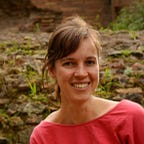Where corn is life
Keeping families together in Guatemala when harvests fail
In Guatemala’s ‘dry corridor’, recurrent drought has forced many people to leave their homes in search of work. Now, the World Food Programme with the European Commission’s Humanitarian Aid department are helping families buy food, allowing them to stay together while supporting the local economy.
For the Mayan Q’anjob’al people in the mountainous Huehuetenango Department of Guatemala, corn is life. It is said the gods created people out of corn, and corn harvesting has been central to the culture and survival of countless generations. Today, it is the most important agricultural activity for many small-scale producers of Mayan origin.
Elvira, a 22-year-old mother, is one of them. Her village, El Chorro Xemal Colotenango, lies in Huehuetenango Department in the so-called dry corridor — a semi-arid zone characterized by periods of drought, degraded soils and low agricultural yields. In some areas, even during the normal rainy season from May to October, it has rained only a few days in three consecutive years.
Elvira and her family once depended entirely on corn harvesting. Outside their house, they grow the sacred grain on leased land. But again this year, the harvest was poor, providing just enough for them to feed themselves for a while. Like hundreds of others in the dry corridor, they struggle to survive. Elvira’s daughter is newly recovering from acute malnutrition.
“In our community we do not have job opportunities,” Elvira told the World Food Programme (WFP). “My father and brothers cannot find any source of income, not even for a day doing any kind of job.”
When the corn harvests fail, Elvira and three of her relatives are forced to travel hundreds of kilometres to look for work. Elvira leaves her children at home with her mother and embarks on a four-month journey to the south of Guatemala or Mexico to find employment on the coffee plantations. For a young woman, the trip is full of risks, and she must spend some of her savings on food, transport and a safe place to sleep.
When she arrives at the coffee plantations, even there, opportunities are dwindling since a plague of coffee rust has drastically cut production. On her last trip, though she managed to find work, the rust meant she was unable to harvest enough to make a decent wage.
After a few months, Elvira usually returns to Colotenango with what little she has earned, using it to buy as much food as she can for her family. But the money doesn’t last long, and soon she needs to make the trip again.
WFP, with support from the European Commission’s Humanitarian Aid department (ECHO), has given a ray of hope to Elvira, her family and fellow residents of Colotenango. With an identity card issued by WFP’s SCOPE platform, they receive a cash transfer, which they can use in local shops to buy food, including fresh local vegetables, like bell peppers (paprika), and chicken.
Elvira and other women receive WFP nutrition counselling, a workshop dedicated to teaching mothers which foods are most nutritious and how best to invest their money for their families, helping them make informed decisions at the market. Additionally, men receive training to better understand their role in their family’s nutrition and to promote gender inclusion.
The support provided by WFP and ECHO allows people like Elvira to stay with their families instead of undergoing the perilous months-long trip to seek work, while providing an additional boost to the local economy. The programme helps to safeguard food and nutrition security in Colotenango and to keep families together — giving back hope to those who had lost it after almost three years of drought in Guatemala.
Find out more about WFP in Guatemala.
Story by Miguel Vargas and Simone Gie
Originally published at insight.wfp.org on August 18, 2017.
